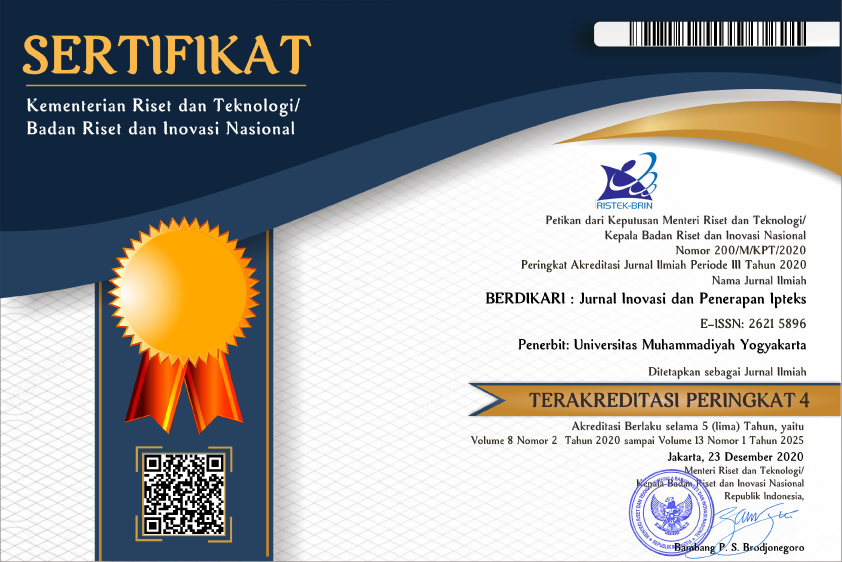Kebijakan Pengelolaan Sampah Bernilai Ekonomi di Desa Tanjung Atap Barat Ogan Ilir
DOI:
https://doi.org/10.18196/berdikari.v11i1.15069Keywords:
Community, Management, Household, Village Regulation, WasteAbstract
This activity addressed waste problems in Tanjung Atap Barat Village, Ogan Ilir Regency. The community has tried to deal with it, but it has not been optimal. Another reason is to increase public awareness of waste management so it becomes a medium to improve the economy and create a society’s legal awareness. Thus, what is village regulations' role in waste management in Tanjung Atap Barat village? What steps can be taken so that the waste problem in Tanjung Atap Barat village becomes of economic value? By following the Regulation of Tanjung Atap Barat Village Number 003 of 2020 About the Management of Household Waste and the Surrounding Environment, the community improves waste management in the village and raises awareness of environmental issues. Village Regulation Number 003 of 2020 has a system consisting of 14 chapters and 37 articles. If it is examined more deeply, waste has the potential to affect household income. Therefore, improvement can start through its citizens, especially women and the younger generation. Every household is involved in managing at least its own waste, socialization, training, mentoring, and direct practice to increase public understanding and knowledge in handling waste into economic value. Especially in Tanjung Atap Barat village, it has started with placing trash cans in every house. Also, waste is segregated by its type: plastic, paper, and household waste.
References
Aryo Sumbogo. 2021. Indonesia Bersiap Kurangi Sampah Plastik di Laut hingga 70 Persen pada 2025. https://www.kompas.tv/article/232602/indonesia-bersiap-kurangi-sampah-plastik-di-laut-hingga-70-persen-pada-2025. 16 November 19:10 WIB.
Ateng Syafrudin dan Suprin Na'a,. 2020. Republik Desa:Pergaulatan Hukum Tradisional dan Hukum Modern dalam Desain Otonomi Desa. P.T Alumni: Bandung.
Ferdricka Nggeboe. 2016. Undang-Undang Nomor 18 Tahun 2008 Tentang Pengelolaan Sampah: Perspektif Penerapan Sanksi dan Peraturan Daerah. Jurnal Hukum PRIORIS, Vol. 5 No. 03 Tahun 2016.
Fheriyal Sri Isriawaty. 2015. Tanggung Jawab Negara Dalam Pemenuhan Hak Atas Kesehatan Masyarakat Berdasarkan Undang-Undang Dasar Negara Republik Indonesia Tahun 1945. Jurnal Ilmu Hukum Legal Opinion Edisi 1 Volume 03 Tahun 2015.
Hadiwijoto,S. 1983. Penanganan dan Pemanfataan Sampah.Yayasan Idayu : Jakarta.
Josef Mario Monteiro. 2016. Pemahaman Dasar Hukum Pemerintahan Daerah. Pustaka Yustisia: Yogyakarta.
Kushandajani. 2008. Otonomi Desa Berbasis Modal Sosial Dalam Perspektif Socio Legal.Jurusan ilmu pemerintahan fisip UNDIP: Semarang.
Mahendra Putra Kurnia, dkk. 2007. Pedoman Naskah Akademik Perda Partisipatif. Kreasi Total Media: Yogyakarta.
Nofriyadi.2021. Warga Keluhkan Tumpukan Sampah di Pasar Tanjung Batu, https://www.tribunpos.com/ogan-ilir/warga-keluhkan-tumpukan-sampah-di-pasar-tanjung-batu. Tanjung Batu: Tribunpos.
Reporter Merdeka. 2021. Indonesia Produksi 66 Juta Ton Limbah Plastik per Tahun Apa Solusinya?.https://www.merdeka.com/uang/indonesia-produksi-66-juta-ton-limbah-plastik-per-tahun-apa-solusinya.html. Jakarta: Merdeka, Selasa 9 November 16:10.
Salahuddin, Surip, dkk. 2020. “Proses Penyusunan Peraturan Desa (Perdes) Inisiatif Badan Permusawaratan Desa di Desa Monta Baru Kecamatan Lambu Kabupaten Bima”, Jurnal Komunikasi dan Kebudayaan ISSN.2443-3519, Volume 7 Nomor 1 Januari-Juni 2020.
Sumber Saparin. Tata Pemerintahan dan Administrasi Pemerintahan Desa. Penerbit Ghalia Indonesia: Jakarta.
Wikipedia Ensiklopedia 2022. Tajung Atap Barat Tanjung Batu Ogan Ilir.https://id.wikipedia.org/wiki/Tanjung_Atap_Barat,_Tanjung_Batu,_Ogan_Ilir 11 Februari 2022 pukul 17:25 WIB
Downloads
Published
Issue
Section
License
Copyright
Authors retain copyright and grant BERDIKARI Jurnal Inovasi dan Penerapan IPTEK the right of first publication with the work simultaneously licensed under an Attribution 4.0 International (CC BY 4.0) that allows others to remix, adapt and build upon the work with an acknowledgment of the work's authorship and of the initial publication in BERDIKARI Jurnal Inovasi dan Penerapan IPTEK.
Authors are permitted to copy and redistribute the journal's published version of the work (e.g., post it to an institutional repository or publish it in a book), with an acknowledgment of its initial publication in BERDIKARI Jurnal Inovasi dan Penerapan IPTEK
License
Articles published in the BERDIKARI Jurnal Inovasi dan Penerapan IPTEK) are licensed under an Attribution 4.0 International (CC BY 4.0) license. You are free to:
- Share — copy and redistribute the material in any medium or format.
- Adapt — remix, transform, and build upon the material for any purpose, even commercially.
This license is acceptable for Free Cultural Works. The licensor cannot revoke these freedoms as long as you follow the license terms. Under the following terms:
- Attribution — You must give appropriate credit, provide a link to the license, and indicate if changes were made. You may do so in any reasonable manner, but not in any way that suggests the licensor endorses you or your use.
- No additional restrictions — You may not apply legal terms or technological measures that legally restrict others from doing anything the license permits.




